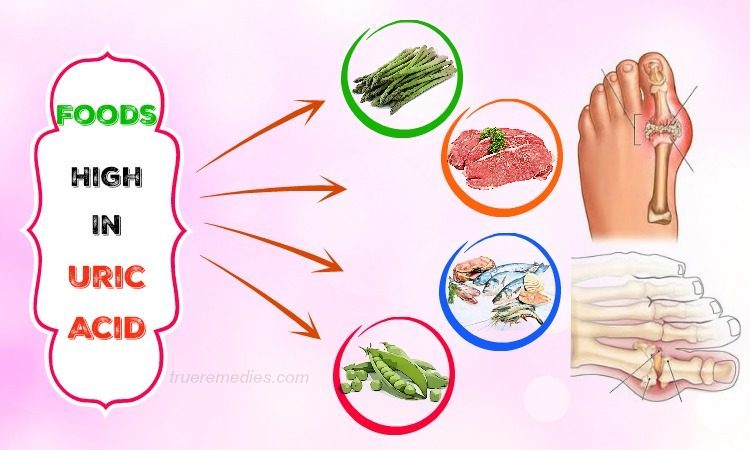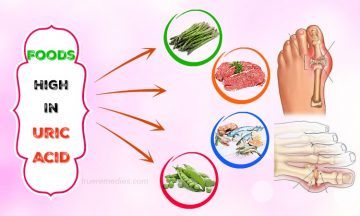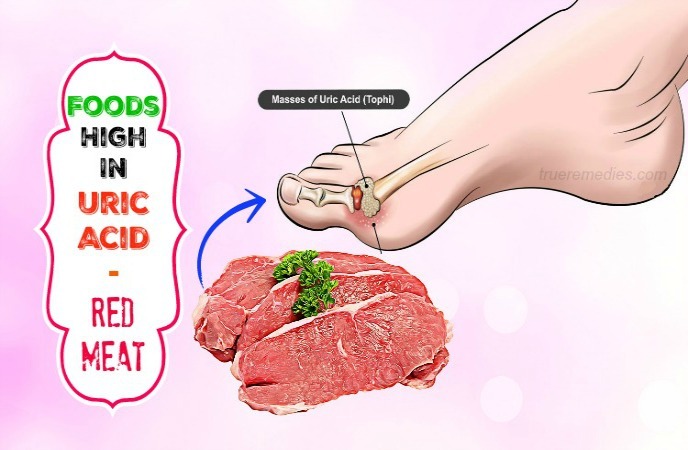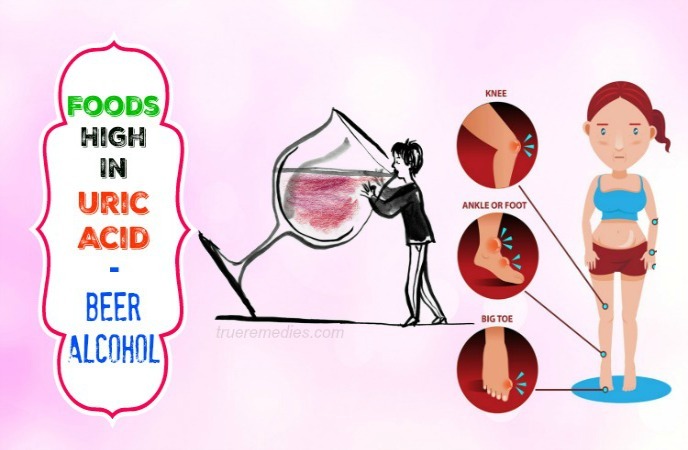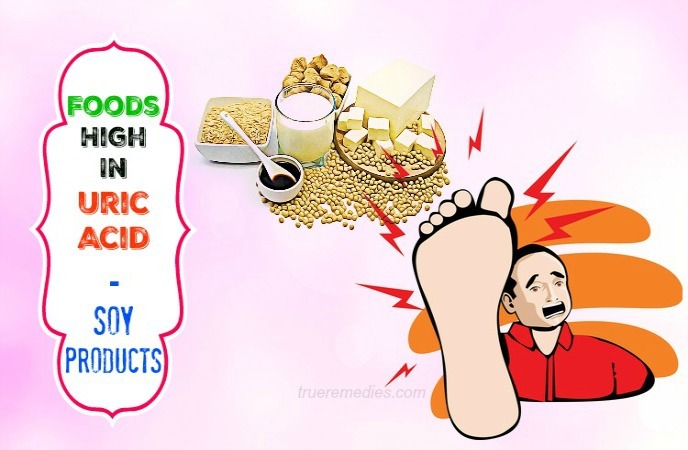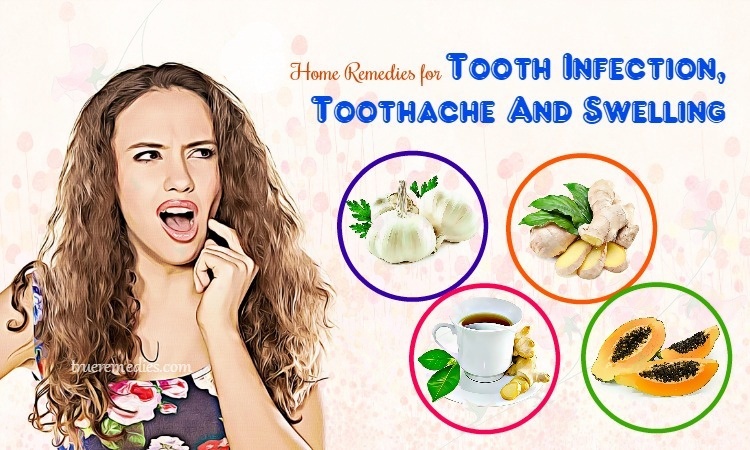CONTENTS
Gout is one of the manifestations of arthritis that occurs mainly in men as well as people with obesity. Gout is one of the most painful forms of arthritis. Although there are many causes of this disease, one of the main causes is that we get a lot of uric acid-rich foods. Gout occurs when too much uric acid accumulates in the body. With this disease, diet plays a very important role, affecting the process of treating the disease. Gout patients suffer from pain from their own bodies, so their individual diets are essential. Patients with gout are advised to have a low uric acid diet. Here are 10 foods high in uric acid that people with gout should avoid to reduce symptoms of this condition actively. However, first, let's take a look at some basic information about this disease, to get an overview of it.
What Is Gout?
Gout is probably the oldest known human disease – more than 2,000 years ago. In the past it was considered a kingship because it often appeared on the rich with rich food and drink. It is now well known as a complex disorder affecting everyone, not just for the rich.
Gout is a disease in the synovial arthritis group. Gout is one of the most painful forms of arthritis. This is a purine human metabolic disorder. Medical studies have shown that gout is one of the most dangerous and painful types of arthritis. It is the most destructive joint disease. Gout occurs when too much uric acid accumulates in the body. Gout is a micro-arthritic arthritis characterized by acute recurrent rheumatoid arthritis. In other words, the main cause of the disease is a high blood uric acid concentration, leading to deposition of sodium urate crystals in tissues, muscle, and joint.
Gout is caused by the accumulation of too much uric acid in the body. Uric acid is produced by the breakdown of substances called purines. Purine is found in all tissues of the body. They are also found in many foods, such as liver, dried beans and peas, and anchovies. Typically, uric acid dissolves in the blood. It excretes the kidneys and leaves the body in the urine. However, uric acid can accumulate in the blood when:
- Increases the amount of uric acid the body produces.
- The kidneys do not excrete uric acid.
- Eating too many foods rich in purines.
Why High Uric Acid Levels Cause Gout?
When a cell in the body dies, the nucleus of that cell is destroyed and uric acid is formed. In plain terms, it is an excess, a product naturally metabolized by the human body. In other words, it is the source of endogenous uric acid.
Uric acid is the end product of the purine degradation process. It is a weak acid that is usually ionized into urate salt dissolved in plasma. The vast majority of uric acid exists in the form of monosodium urate. The solubility limit of urate salt is about 6.8 mg / dl at 37°C. At higher concentrations, urate crystals are precipitated. However, in some cases, urate crystals are not precipitated due to the effects of some serum soluble substances. Most uric acid in the blood is free, only <4% associated with serum proteins. Mean blood uric acid levels in men is 5.1 ± 1.0 mg / dl (420 μmol / L), and in women is 4.0 ± 1 mg / dl (360 μmol / L).When the blood uric acid level crosses the upper limit, it is considered to have elevated uric acid. Normally, the synthesis and secretion of uric acid is in equilibrium. The total amount of uric acid in the body is about 1200 mg (in men), and 600 mg (in women). When uric acid forms in the body, approximately two thirds of total uric acid are synthesized and the same number excreted primarily by the kidney.
TrueRemedies Partner Solutions

Need a Help from the Leading Expert Online, Available 24/7?
They’re all here and ready to answer your questions online or by phone. Keep asking questions until you get the answer you need.
Organ meats, seafood … are foods that have cell nuclei and can also be transformed into endogenous uric acid. In the course of the body's metabolism, if the source of many uric acid is released less, it will cause uric acid to accumulate in the blood, depositing it in the tissues of the cell. The places where it settles most are in joints. This causes gout. Not only in the joints, uric acid also deposits in the heart and causes cardiovascular disease. It exists in the kidneys causing kidney failure, and persists in the urinary tract causing kidney stones.
In fact, many people think that every uric acid increase in blood disease gout should buy medicine to use. However, the truth is that this concept is completely wrong, because gout occurs when there is an increase of uric acid in the blood that accompanied by the deposition of uric acids, resulting in joint damage or lesions in other organs in the body [1].
What Are Symptoms Of Gout?
Gout is one of the most painful forms of arthritis. Gout occurs when too much uric acid accumulates in the body. Uric acid accumulation can lead to:
- The sharp uric acid crystals are deposited at the joints, usually at the toes.
- The uric acid deposits (called urate) look like lumps under the skin.
- Kidney stones from uric acid crystals in the kidneys.
For many people, the first pain caused by gout occurs in the big toe. Usually, the pain causes a sleeping person to wake up. The toes are very painful, red, warm and swollen. Gout can cause hurt, swelling, hot, and stiff joints.
In addition to the big toe, gout can affect the feet, ankle, heel, knee, wrist, finger, and elbow. Gout pain can be caused by stressful events, alcohol or drugs or another illness. The initial pain usually relieved within 3 to 10 days, even if not treated. The next pain may not appear for months or even years.
Who Is At High Risk Of Gout?
You are more likely to have gout if:
- You have a family member who has this disease
- You are a man
- Overweight
- Drinking too much alcohol
- Eating too many purine-rich foods
- Having an enzyme defect makes it difficult for the body to break down purines
- Exposure to lead in the environment
- Transplanted parts
- Using some medications like diuretics, aspirin, cyclosporin or levodopa
- Using vitamin niacin.
When To See A Doctor?
High uric acid levels are not a medical condition, and it will not be dangerous if you do not have the symptoms associated with it. However, for gout or kidney stones patients, this may be a sign of harm to your health and you should see your doctor for treatment. When taking the drug, patients should watch for and prevent drug reactions, inform the doctor promptly for advice on stopping the use of drugs or need to go to the hospital for treatment in time. In addition, if you have symptoms of uric acid, but the use of treatments that your doctor has designated do not work, you should go to see a doctor to be checked again.
Above is the basic information about gout and high uric acid levels. To avoid these conditions, it is important to have a proper diet not containing foods high in uric acid. However, many people are not interested in this issue, causing some undesirable consequences. In addition, there are many people who are interested in this, but have not found a document that provides adequate knowledge about this problem. Therefore, this article was written. It is time to find out what 10 gout-causing foods high in uric acid to avoid are. Take a look at TrueRemedies.com!
10 Gout-Causing Foods High In Uric Acid To Avoid
1. Foods High In Uric Acid – Red Meat
Red meats such as meat of buffalo, cow, horse and goat are the foods that people with gout should avoid. The purine content of these meats is different. For patients with gout, white meat is better than red meat. This group of foods contains a lot of good nutrition for the body such as typical iron, calcium, zinc, and especially protid minerals. The very rich source of nutrients that red meat provides helps in the process of forming the body's cell, creating pressure on the glue plasma and providing abundant energy for all living activities of the muscle. Therefore, these kinds of food play an extremely important role for the body to replenish daily.
However, for people with gout, experts recommend that absolutely abstain or limit red meat to avoid more severe illness. Explain this, you should first know the cause of gout is due to the too high levels of uric acid levels in the blood. In it, the food contains many purines. When purines into the body, they will be converted into uric acid by enzymes. Therefore, if gout patients eat too many foods rich in purines, it will cause recurrent gout, causing severe pain. Red meat has been identified as one of the leading ingredients that cause gout because it contains many purines, which most experts recommend should not be used [2] [3].
You may want to know the way to convert red meat into uric acid. When you supply red meat to your body through the digestive tract, enzymes (nuclease, xanthinoxydase, or hypoxanthinoxydase) will break down proteins in red meat into amino acids. After that, this substance is further transformed into xanthin and finally uric acid. It can be said that uric acid is the end product of protein breakdown in the body. Therefore, when you eat too much red meat, it will increase uric acid levels in the blood. This is not beneficial for people with gout.
Although red meat belongs to the gout diet, but to ensure healthy energy needs, we still need to provide the protid through other sources of food such as white meat, white pork, and white chicken. However, you need to supplement with moderate content to ensure good health.
2. Seafood
Among the foods high in uric acid that this article mentions, seafood is one of the most noticeable ones. A 12-year study of 4700 randomized studies conducted by American colleges and universities revealed part of the question: “Is eating seafood good for gout patients?” Based on the results, they found that those who consumed more meat at meals had a 1.41-fold higher risk of gout than those who ate normal meals. While the incidence of gout in people who regularly eat seafood compared with others up to 1.51 times. Although the numbers between the two groups are small, it also shows the great impact of seafood on people with gout. If you regularly eat seafood (at least twice a week), the rate of infection will increase by 7%.
Seafood is a favorite food of many people, they contain a lot of protein and nutrients, rich in vitamins and minerals such as calcium, zinc, iron, copper, and potassium. In addition, seafood is also very low in saturated fat and unsaturated fatty acids Omega-3 – which are the essential fats for the body. However, for people with gout, seafood is a food that needs to be limited to daily menus. Ideally, people with gout should cut down on seafood such as salmon, tuna, herring, sardines, shrimp, crabs, etc. because these foods contain a lot of purine and they are easily converted to uric acid which stagnates in soft tissues and joints.
However, according to scientists, gout patients do not need to strictly abstain from seafood such as shrimp, crabs, fish and shellfish. They can still use a moderate amount as long as the amount of protein from those foods does not exceed the standard of 1g protein for 1kg of weight per day. Gout people can eat river fish, because they contain less purine.
A very important note is that when eating seafood, you should not drink beer, because it is very susceptible to gout. In the process of human metabolism, the amount of purine in seafood will form uric acid. As you know, uric acid excess can cause gout and other diseases. Eating plenty of seafood at once and drinking beer at the same time will increase the formation of uric acid. Excess uric acid accumulates in the joints or soft tissues, which makes it easier to gout.
3. Foods High In Uric Acid – Animal Organs
When it comes to foods high in uric acid, animal organs seem to be known by most gout sufferers and general people. Red meat from animals can cause gout, but on the other hand, animal organs such as animal liver, kidney, spleen, and brain are the same causes of this disease. On the nutrition side, these foods contain a lot of protein and fat. The heart and liver of animals are rich in iron and vitamin A. The downside is that they are high in fat, especially high in cholesterol. For example, in the pig's brain, there are up to 2,500 mg of cholesterol, which is eight times the daily requirement (One day each person should only eat about 250-300 mg of cholesterol).
It is recommended that people with gout should not eat animal organs. This advice is always given to any patient with chronic gout to minimize the risk of getting worse. The reason is because the experts found in the animal organs have high levels of nutrients, especially protid. This substance, when enters the body through the diet, will be converted into amino acids and purines. Because of the enzymes present in the gastrointestinal tract, such as hypoxanthinoxydase, the purine nucleus is converted into uric acid. As you know, elevated uric acid levels increase urate crystallization, which makes gout more serious. Therefore, if a person suffering from gout consumes too much processed food from animal organs, this will raise uric acid level and cause heavier gout.
Besides, animal organs also contain high levels of cholesterol and fat. This is the most serious risk of gout becoming the most serious form of tonic fatality. Because cholesterol and fatty acids can cause blockage and arteriosclerosis, the filtration and elimination of uric acid in the blood is also stuck. This causes metabolic disorders and increases the risk for gout. Furthermore, with the lack of strict management of food hygiene and safety, there are more and more potential problems for animal organs. Therefore, animal organs are the foods that should be limited to prevent as well as treat gout.
4. Beer And Alcohol
Scientists at Harvard University School of Public Health in Boston, USA looked at the relationship between drinking beer, spirits and wine with blood uric acid levels of 14,809 at the age of at least 20. The results showed that the uric acid concentration in the blood of people who regularly drink beer is the biggest, and then is the uric acid concentration in the blood of people who drink a lot of alcohol.
Another example, a study conducted by the Canadian Medical Association Journal in 1984 found that 24 patients with gout were diagnosed correctly according to American Association of Arthritis criteria including age, weight, sex and diuretics. Doctors have asked about the drinking of alcohol and beer of the patients over the past five years and received almost the same answers. Results showed that patients who drank too much alcohol during this period showed more severe gout symptoms, accompanied by increased gout pain.
Drinking beer doubles the risk for gout. According to experts, drinking beer not only increases the level of uric acid but also prevents the body from removing this substance from your body. Besides, alcohol is also a bad drink for patients with gout. Alcohol and beer contain high levels of purines, which are converted to uric acid in the blood. These drinks contribute significantly to increase risk of gout. Regular drinkers have the potential to rapidly increase blood uric acid levels by about 40 mmol / L and xanthines (1.5 mmol / L for hypoxanthine and 5 mmol / L for xanthine).
For beer, researchers believe it is the main risk for gout because it contains very high levels of purine. Through digestion, the purine compounds break down to form uric acid. Typically, uric acid is excreted from the body through the urine. However, if the kidneys cannot handle all the uric acid, the blood uric acid level will increase. The uric acid then continues to precipitate and form crystal deposits in the joint. After a while, the precipitation increases and forms tumors. That is the cause of gout disease in many people.
Many people think that alcohol is less likely to cause gout to develop, and some even think that drunks will relieve the pain caused by gout attacks. This is completely wrong. Although the amount of purines in alcohol is very low, it decreases the secretion of liver and kidneys, and indirectly increases uric acid levels in the blood. Studies have also shown that drinking more beer is more at risk for gout than alcohol and other alcoholic beverages. Because beer contains not only alcohol, it also contains many purines. Therefore, if you cannot stop using beer and spirits right away, you can drink a little red wine instead.
5. Foods High In Uric Acid -Beverages Having Sugar
Bottled water is generally an industrial drink. They are diverse in design, type and flavor. These drinks often have the advantages of modernity (in accordance with youth preferences and personalities), convenience (users can drink deliciously at anytime and anywhere). Therefore, they are widely used and very popular. However, the relationship between bottled beverages and some diseases including gout has been shown. A study published in the Journal of the American Medical Association showed that syrups lead to an increased risk of gout. The number of gout cases has doubled in the United States in recent years, and fructose – a type of sugar found in fresh water – is the cause. In the UK, about 1.5% of the population is suffering from gout and the number has been increasing for the past 30 years.
Experts note that the increase in the number of gout cases associated with the increase of bottled beverage consumption. Meanwhile, previous studies also confirmed that fructose increased uric acid levels in the blood. One study found that people who usually drank bottled beverages, especially bottled beverages have sugar, were twice as likely to get gout as those who did not use them, especially women (correlations are derived after taking into account other risk factors such as body mass index, age, blood’s pressure and alcohol consumption). At the same time, these beverages also increase the attacks of gout, causing more pain for people with this condition. Using more than two cups of sugary soft drinks per day increases the risk of gout. Therefore gout patients need to limit this drink.
Unsweetened bottled water does not increase the risk of gout, but fruit juice and fructose such as apples and oranges increase the risk. However, researchers also suggest that people need to balance vegetables to prevent heart disease and stroke. Restricting fresh bottle water and juice is essential for good health. In addition, gout patients should drink plenty of water during the day to promote urinary uric acid excretion to better support gout treatment.
6. Asparagus
This is one of the foods high in uric acid that few people know. Asparagus is scientifically named Asparagus Officinalis. Asparagus has yellow or light green flowers. Asparagus is a plant with high nutritional content (protit 2.2%, cellulose 2.3%,…). It works to lower blood pressure and helps reduce cholesterol level in the body Asparagus is considered to be the drug of choice for men. It is a vegetable that contains alot of essential nutrients for the body. It is also considered as a natural sexual stimulant.
The latest research shows that asparagus contains high levels of vitamins and minerals which are very good for health. In particular, glutathione and asparagine in asparagus are naturally anti-aging. They also have the potential to prevent cancer. However, as with the beneficial ingredients, asparagus also contains high purine content. Therefore, with people with gout, it is a food which can cause joint pain when using. There is a food framework that people with gout should apply: Group with low purine includes: grains, eggs, milk, cheese, vegetables, and nuts (less than 15mg / 100g food). Fish, seafood, meat, and beans are grouped with medium purine (about 50-150 / 100g food). Asparagus, animal brains, animal liver,… are the highest purine group (over 150mg / 100g food). This makes asparagus become one of the enemies of gout patients.
7. Foods High In Uric Acid -Soy Products
The next food item in this list of foods high in uric acid that this article refers to is soy products. Soy products include tofu, soybean meal, and soybean milk. These are foods that work well for normal human health, but not for gout patients because they are high in protein. It is very easy to hurt the joints in the body, causing numbness, pain and discomfort. If the disease be more severe, it will directly affect the health of patients. Tofu contains a lot of protein, so when you eat too much tofu, the concentration of uric acid in the body can increase causing many manifestations of gout appear. It messes up the purine metabolism in gout patients. When eating more tofu, people with gout will suffer severe pain, swelling and inflammation of the joints. Therefore, all patients with gout should be restricted to eating tofu.
8. Peas
This is another food item in this list of foods high in uric acid that few people know. Peas are known to be a good source of nutrients for the body. It has the ability to prevent many different diseases. However, for people with gout, this food needs to be limited to avoid getting worse.
Beans are rich in folic acid, vitamin C, K1, B and many other substances. It is known that these ingredients are capable of activating proteins that increase protein metabolism in the body. However, when the protein is metabolized strongly, it will produce uric acid. Uric acid is the end product of this process. As you know, gout is caused by elevated levels of uric acid in the blood. Therefore, gout patients should limit the addition of peas to support better treatment.
9. Foods High In Uric Acid – Eggs
The next one in this list of foods high in uric acid is eggs. Eggs contain most B vitamins (from B1 to B12) including choline, biotin and folic acid. An egg contains about 100mg of choline, and no food contains more choline than eggs. Choline keeps the membrane stable. It plays a role in neurotransmitters. It prevents accumulation of homocysteine in the bloodstream causing cardiovascular disease. However, people with gout should not eat too many eggs because omega levels in eggs will directly affect their condition. The omega content in eggs greatly affects the condition of the person. If the omega content is too large, it will cause an increase in the amount of choresterine in the blood. Experts therefore suggest that people with gout should limit their intake of eggs.
Top nutrition experts in the United States advise gout patients to supplement 800g of eggs per week. It is best to eat an egg per day for the gout. Do not eat too many eggs because the fat content in eggs can make people gain weight, which increases the risk of severe gout. In particular, patients should also pay attention to the way to cook eggs. Absolutely do not fry eggs because this dish contains fat content, so it is not good for people with gout health.
10. Mushrooms
The last one in this list of 10 gout-causing foods high in uric acid to avoid is mushrooms. There are currently about 140,000 types of mushroom on the planet, some mushroom have very good healing properties, because they contain special substances that no food contains. You know that they are a good source of vitamin B, selenium, copper, phosphorus, potassium, zinc, manganese, riboflavin, niacin, ergothioneine – a powerful antioxidant, vitamins and minerals. Any kind of mushroom contains higher protein content than other fruit vegetables. In addition to protein, mushrooms contain other nutrients such as vitamin B2, B12, calcium, and some amino acids that the body does not synthesize itself.
Eating mushrooms is a substitute for meat for vegetarians to maintain adequate nutrition. However, for gout patients, this is not beneficial. They further aggravate the gout disease. Eating mushrooms increases the rate of uric acid synthesis in the body. This increases the symptoms of gout. Eating mushrooms causes the AU index to rise. This does not benefit the gout patients.
The above are foods high in uric acid that patients with gout should limit eating. Although they may be your favorite foods, stay away from them until your illness is actually cured. If you have any contributing ideas about our article of “Top 10 gout-causing foods high in uric acid to avoid” introduced in Superfoods Category, do not hesitate to drop your words below this post. We will answer as soon as we could.

